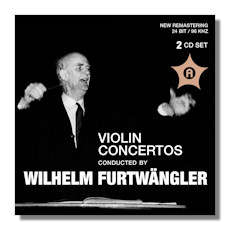
The Internet's Premier Classical Music Source
Related Links
-
Beethoven Reviews
Brahms Reviews
Mendelssohn Reviews
Sibelius Reviews - Latest Reviews
- More Reviews
-
By Composer
-
Collections
DVD & Blu-ray
Books
Concert Reviews
Articles/Interviews
Software
Audio
Search Amazon
Recommended Links
Site News
 CD Review
CD Review
Great Concertos

- Ludwig van Beethoven: Violin Concerto 1
- Felix Mendelssohn: Violin Concerto 2
- Johannes Brahms: Violin Concerto 3
- Jean Sibelius: Violin Concerto 4
1 Erich Röhn, violin
2 Gioconda de Vito, violin
3 Yehudi Menuhin, violin
4 Georg Kulenkampff, violin
1,4 Berlin Philharmonic Orchestra/Wilhelm Furtwängler
2 Orchestra Sinfonica di Torino Della RAI/Wilhelm Furtwängler
3 Lucerne Festival Orchestra/Wilhelm Furtwängler
Andromeda ANDRCD9122 2CDs
These performances should all be reasonably familiar, especially to Furtwängler's many fans, but to my knowledge this is the easiest – if not only – way to get them all in one place. As one who does not count himself among those fans save for a few indispensible recordings, I can say that I found this set revelatory, and some may even deem it essential.
The Beethoven is the least noteworthy reading of the four. Erich Röhn was the Berlin Philharmonic's concertmaster in those days, but that wasn't quite the high-gloss job it is now. The orchestra itself isn't especially notable, and this issue – last seen on Deutsche Grammophon – is surpassed in every way but the conductors' later effort with Yehudi Menuhin on EMI. Still, this hasn't always been the easiest rendition to locate, so it holds value to those interested in violinists, or the history of the Philharmonic.
Gioconda de Vito retired in her mid-fifties, deciding to end her career when she was at the height of her powers. Furtwängler worked often with her, according to many sources, and their congenial partnership results in a very fine Mendelssohn concerto. The violinist tackles the solo part with relative ease, some screechy passages in the upper register notwithstanding. It really is a very giving, generous take. Better yet, Furtwängler rallies his Italian Radio forces to provide a massively imposing framework that only occasionally turns ponderous. Is it subtle? No, it isn't, but it is dark and rich. I like the unique qualities, such as they are. It would take a great deal to convince me that these are the cleanest pressings available, though. Even for a historical release, there is some notable scratching and popping that the ear adjusts to, but proves initially irritating. Still, this is a commanding reading that demands your attention.
Disc two is just as successful. Yehudi Menuhin's Brahms is well-known by now, and usually takes a backseat to his later recording with Rudolf Kempe. I've never much liked that later version, finding Kempe less than convincing as a Brahms conductor. Moreover, Menuhin is too relaxed, though he has few of the intonation problems that would mar his last performing years. Hearing his collaboration in this work with Furtwängler for the first time, I find the overall conceptions surprisingly alike; Menuhin is no Heifetz, for example. However, the older conductor certainly mastered Brahms, and if his symphonies were often ill-realized, his forceful and full-bodied accompaniment is outstanding here. The Lucerne Festival Orchestra cannot match Kempe's Karajan-era Berlin Philharmonic, but they provide a more than suitable backdrop. So uneven are Menuhin's later recordings that it's easy to forget that he was one of the last century's very best. His elegance, warmth, and sincerity of expression ironically compliment Furtwängler's heavier, brooding outlook. And if, as in his later recording, the violinist seems a little too laid back, he spins enough gorgeous tunes to compensate.
Finally, we have a rarity with Furtwängler conducting Sibelius. This and En Saga are the only two works from the Finnish master in the conductors' vast discography. Georg Kulenkampff was previously unknown to me (there are no notes with this release, either) but his take on the solo part proves highly distinctive. Sibelius had few champions in Germany before Karajan, and while I generally don't believe that doing something rare in music equates to doing something good, the conductor and soloist prove compelling in a piece that must have been unfamiliar to all involved. Furtwängler is fascinating here; the orchestral parts are heavy-gaited and mostly unidiomatic, but they are also stirring and compliment the soloists' extroverted reading. Although the bass line is mush throughout, Kulenkampff's violin is clear and well-caught.
To sum this up is as follows. The Beethoven is unspectacular, but not often issued. In the Mendelssohn, we have two artists who work very well together, in iffy sound. The Brahms is excellent, the Sibelius unorthodox but no less so. Fans of the conductor will relish having all of these in one easy package, while beginners may be more cautious, given the lack of notes and obvious age of the recordings. Still, I can recommend this with ease, and am happy to report myself more enthusiastic than I originally expected.
Copyright © 2014, Brian Wigman




















